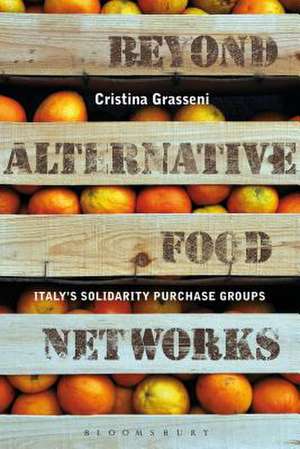Beyond Alternative Food Networks: Italy’s Solidarity Purchase Groups
Autor Prof Cristina Grassenien Limba Engleză Paperback – 9 oct 2013
| Toate formatele și edițiile | Preț | Express |
|---|---|---|
| Paperback (1) | 218.00 lei 6-8 săpt. | |
| Bloomsbury Publishing – 9 oct 2013 | 218.00 lei 6-8 săpt. | |
| Hardback (1) | 714.92 lei 6-8 săpt. | |
| Bloomsbury Publishing – 9 oct 2013 | 714.92 lei 6-8 săpt. |
Preț: 218.00 lei
Preț vechi: 245.49 lei
-11% Nou
Puncte Express: 327
Preț estimativ în valută:
41.72€ • 45.30$ • 35.04£
41.72€ • 45.30$ • 35.04£
Carte tipărită la comandă
Livrare economică 23 aprilie-07 mai
Preluare comenzi: 021 569.72.76
Specificații
ISBN-13: 9780857852281
ISBN-10: 0857852280
Pagini: 224
Ilustrații: 14 bw illus
Dimensiuni: 156 x 234 x 18 mm
Greutate: 0.36 kg
Editura: Bloomsbury Publishing
Colecția Bloomsbury Academic
Locul publicării:London, United Kingdom
ISBN-10: 0857852280
Pagini: 224
Ilustrații: 14 bw illus
Dimensiuni: 156 x 234 x 18 mm
Greutate: 0.36 kg
Editura: Bloomsbury Publishing
Colecția Bloomsbury Academic
Locul publicării:London, United Kingdom
Caracteristici
Through the author's direct involvement with these local food networks, we gain a unique insider perspective on the key practices of producing, selling and consuming food and the political challenges such groups face
Notă biografică
Cristina Grasseni is a tenured researcher at Bergamo University, Italy, and Visiting Scholar at the Anthropology Department of Harvard University, USA (2012-14). She was David & Roberta Logie Fellow and Harvard Film Study Center Fellow at the Radcliffe Institute for Advanced Study (2011/12). Amongst her recent books are: Developing Skill Developing Vision. Practices of Locality at the Food of the Alps (2009) and Skilled Visions. Between Apprenticeship and Standards (2007).
Cuprins
AcknowledgementsList of FiguresIntroductionAlternative Provisioning NetworksThe Reinvention of FoodRe-weaving the EconomyNetworks in LaborSeeds of TrustConclusionNotesGlossaryReferencesIndex
Recenzii
This stimulating book helps move our thinking about ethical consumption into new areas, for it shows how alternative food networks can lead to new forms of social organisation that raise questions about civil society and co-operation and, ultimately, about states and political legitimacy.
Beyond Alternative Food Networks is a richly detailed ethnographic exploration of Italy's agricultural "solidarity economy" movement, in which farmers and consumers negotiate the terms of producing, selling, buying and preparing food. But it is much more than a book about alternative ways of sourcing and consuming food. Grasseni's work challenges the rationalist mythology at the heart of capitalism and reveals the affective relations and contingent practices that constitute community and economy in today's world.
Much more than a food book, Grasseni has gifted us with a new way of thinking about transforming capitalism into something more humane and sustainable. Her account of the Italian model of Solidarity Purchase Groups should be required reading for everyone involved in building alternatives to corporate and industrial food. It is also a groundbreaking account how people organize and manage cooperative democracy. At a time of economic crisis in many parts of the world, this book gives us a positive model for rebuilding local economies.
With an anthropologist's eye for detail and a philosopher's capacity to see the big picture, Cristina Grasseni provides a fascinating look at how collective action and solidarity are transforming food systems, culture and activism. Focusing on recent developments in northern Italy, her study yields valuable insights into how alternative approaches to food provisioning can transform social and economic relationships in ways that bode well for contemporary global challenges of sustainability, social justice and rebuilding human relations based on trust.
Grasseni challenges the reader to ponder a variety of questions she has come across in her studies, including whether a truly socialist network of citizens can change our current reliance on commodity-based, cheap, unsustainable food chains, or if we have gone too far in our destruction of the environment and our own willingness to sacrifice personal health to recover.
Beyond Alternative Food Networks is a richly detailed ethnographic exploration of Italy's agricultural "solidarity economy" movement, in which farmers and consumers negotiate the terms of producing, selling, buying and preparing food. But it is much more than a book about alternative ways of sourcing and consuming food. Grasseni's work challenges the rationalist mythology at the heart of capitalism and reveals the affective relations and contingent practices that constitute community and economy in today's world.
Much more than a food book, Grasseni has gifted us with a new way of thinking about transforming capitalism into something more humane and sustainable. Her account of the Italian model of Solidarity Purchase Groups should be required reading for everyone involved in building alternatives to corporate and industrial food. It is also a groundbreaking account how people organize and manage cooperative democracy. At a time of economic crisis in many parts of the world, this book gives us a positive model for rebuilding local economies.
With an anthropologist's eye for detail and a philosopher's capacity to see the big picture, Cristina Grasseni provides a fascinating look at how collective action and solidarity are transforming food systems, culture and activism. Focusing on recent developments in northern Italy, her study yields valuable insights into how alternative approaches to food provisioning can transform social and economic relationships in ways that bode well for contemporary global challenges of sustainability, social justice and rebuilding human relations based on trust.
Grasseni challenges the reader to ponder a variety of questions she has come across in her studies, including whether a truly socialist network of citizens can change our current reliance on commodity-based, cheap, unsustainable food chains, or if we have gone too far in our destruction of the environment and our own willingness to sacrifice personal health to recover.
Descriere
Alternative Food Networks is a robust ethnography providing theoretical insight and anecdotal evidence of how alternative economies can become embedded in active citizenship practices, cooperative relationships, and social networks.















